New Jersey divorce records are publicly available for citizens to search for free. As a result, people can access these records to perform a genealogy search, learn more about someone in their life or any other lawful reason.
Like other court documents, New Jersey’s Open Public Records Act authorizes citizens’ access to divorce records. However, while this act provides the right to access and inspect these records, government agencies are not directed on the specific means by which they must comply with this law. Thus, there is no uniform procedure for accessing records under this state statute.
This article walks you through what information is available when accessing divorce records and the specific ways in which you can search and request this information.
This resource was written by Attorney Robert Bailey Jr, who holds a Juris Doctorate from Widener University School of Law.
New Jersey Divorce Record Availability & Accessibility
When it comes to the availability of divorce records in New Jersey, citizens are able to access this information just like other types of court records. The New Jersey Open Public Records Act allows an interested party to access this information through the record custodian.1
However, certain information may be redacted from these records. For instance, personal identifying information such as social security or phone numbers must be redacted. The court may also consider redacting other sensitive information, such as a custody evaluation or other data related to minor children.
Beyond divorce records, other related divorce information is publicly available. For instance, you can get the latest information on divorce rates from the Centers for Disease Control and Prevention’s National Center for Health Statistics. According to their most recently available data (2021), the divorce rate in New Jersey is 2.2 per 1,000 people.
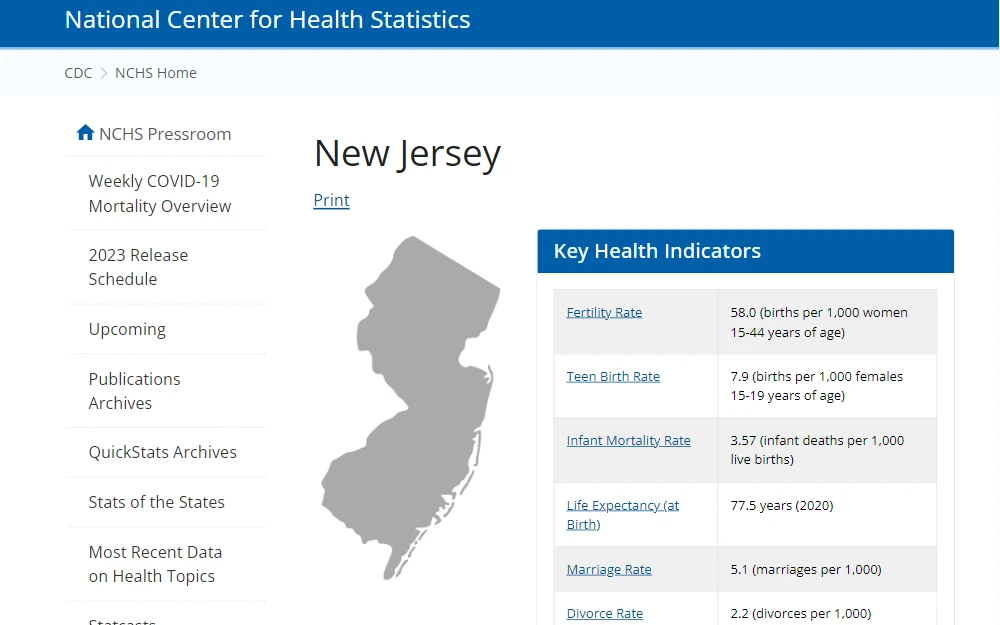
This is slightly lower than the average divorce rate of 2.5 per 1,000 people throughout the United States.
You can also get related divorce data from the Census Bureau.
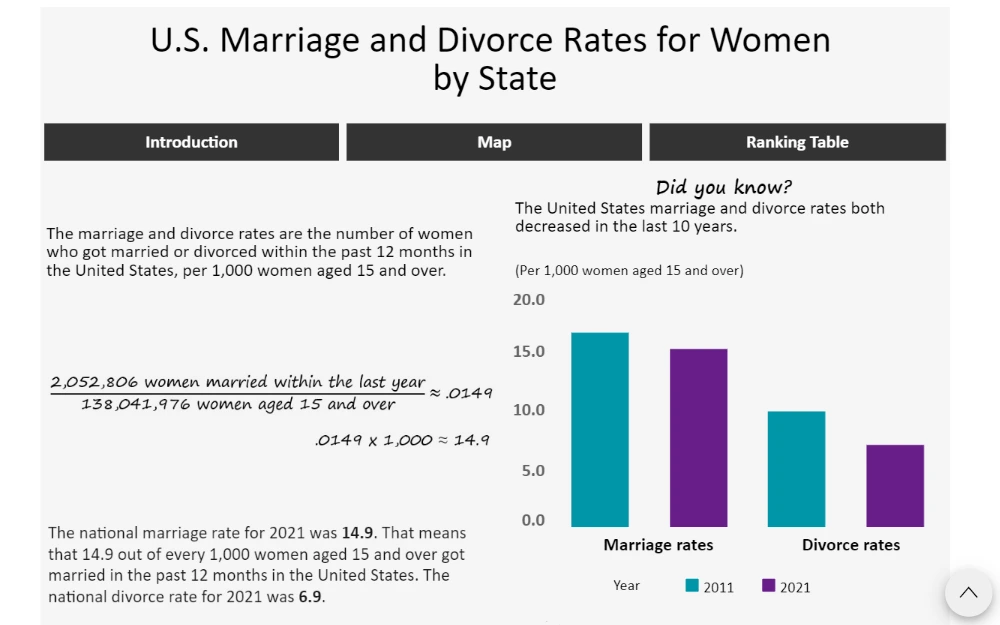
How To Access New Jersey Divorce Records (Free)
An individual can also submit a Records Request Form with the New Jersey Judiciary for divorce records. To make a request, you must provide a sufficient amount of identifying information to ensure the divorce record can be found.
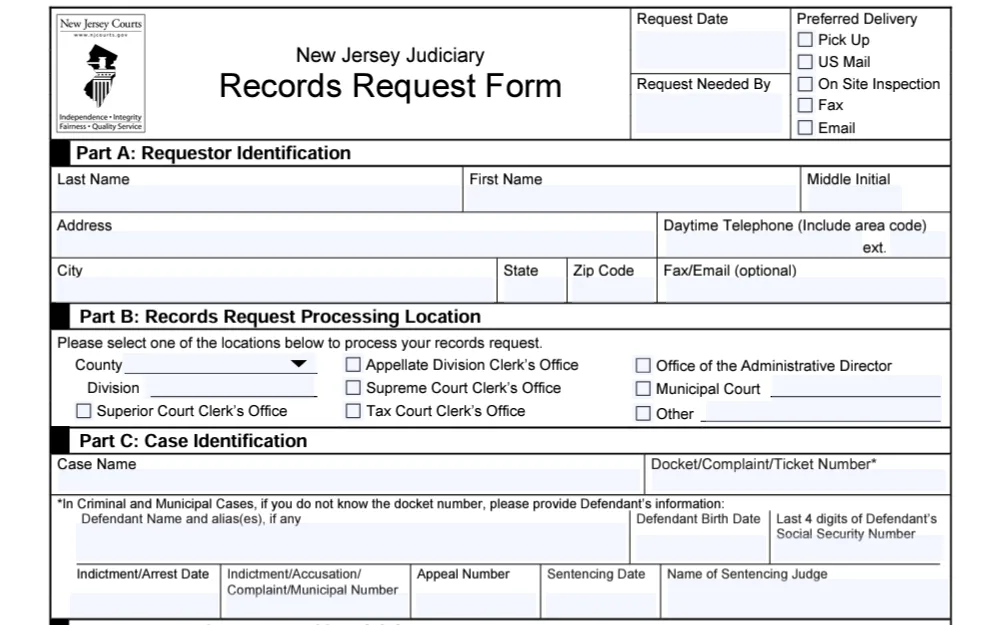
To assist you in filling this out, below is a brief explanation of the type of information you must provide in each section of this form.
Requester Identification: This section requires you to provide your identifying information and indicate how you want to receive the records. You can choose mail, fax, or email. Alternatively, you can pick up the record or perform an on-site inspection.
Records Request Processing Location: Start by selecting the “Superior Court Clerk’s Office.” The New Jersey Superior Court is responsible for adjudicating and maintaining divorce cases. For the division, enter “Family Law.” Finally, you will have to let the Judiciary know which county handled the divorce case.
Case Identification: Here, you can enter the parties to the divorce in the case name section, and if available, you can also include the case number. If you do not have the case number, you can call the customer service unit of the Superior Court Clerk’s Office at 609-421-6100.5 They can provide this information if you know the county where the divorce occurred, the year filed and the parties’ names.
Records Requested By Division: This section provides the requester with the opportunity to provide any additional information that may assist the New Jersey Judiciary in identifying the record. For instance, you may want to include a divorce date or other identifying information that could help track down the record.
Copy Fees: Lastly, you will want to indicate if you have any special copy requests. For instance, you have several options, including a request for a certified or exemplified record.
An individual can submit a request using the Judiciary Electronic Document Submission (JEDS) Tool. If you are unable to submit your request online, you can mail your Record Request Form to the address below:
Superior Court Clerk’s Office
Richard J. Hughes Justice Complex
P.O. Box 971
Trenton, NJ 08625
For additional questions on submitting a record request, you can send an email to [email protected] or call them at 609-421-6100.6
If you just need proof that a marriage ended, you can request a divorce certificate from the Superior Court Clerk’s Office where the case was filed. While some states provide this service through a vital records office, New Jersey does not provide this centralized option.
A certificate of divorce can provide you with the name of the parties, the date the divorce decree was issued, along with the county and case number. This document is often used for business or legal reasons in which a person needs to provide proof of their marital status. Examples of when a certificate of divorce is needed include insurance claims, lawsuits and name change requests.
More information on accessing public divorce records at the county level is provided below.
Note: The New Jersey Judiciary does provide an online search tool for cases throughout the state. However, the tool does not provide any direct way to search divorce records without the docket number. Even with a docket number, the New Jersey Judiciary does not explicitly state whether family law cases such as divorces can be accessed through this tool.
Requesting Divorce Records in NJ via Local Counties
State agencies and resources are not your only options for performing free public divorce records search. While state-level searches have their own benefits, you also have the option of searching for divorce records at the county level.
Depending on the county, you may find that the process is easier than accessing divorce records at the state level. They may have a quicker processing time or afford you the opportunity to talk to someone in person.
While we cannot cover every county, below is information on how to access divorce records in New Jersey’s four largest counties. Use this as a general guide to figuring out how to search for divorce records in other New Jersey counties.
The largest county in New Jersey is Bergen County. To find a divorce record in Bergen County, you will have to contact the Clerk’s Office. For non-archived divorce records, the Bergen County Clerk is the record custodian.
A citizen can contact the Bergen County Clerk by phone at 201-336-7000 or by email at [email protected].
The Bergen County Clerk is available Monday through Friday from 8:30 AM to 4:30 PM.7 If you want to talk to someone in person or inspect records, their office is located at the address below:
Bergen County Clerk
One Bergen County Plaza
Hackensack, New Jersey 07601
Middlesex County has the second largest population in New Jersey. If you want access to divorce information in this county, you can start by reaching out to the Middlesex County Family Court. They can provide decrees from 2016 to the present.
You can call them at 732-645-4300 or go to the address below:
Middlesex County Family Courthouse
120 New St.
New Brunswick, New Jersey 08903
If the record is older but not yet archived, you may want to reach out to the Middlesex County Clerk.8 To ask about the availability of divorce records, you can call them at 732-745-3827. The Clerk’s Office is open from 8:30 AM to 4:10 PM, Monday through Friday.
The Middlesex County Clerk is located at the address below:
Office of the County Clerk
County Administration Building
75 Bayard St.
Fourth Fl.
New Brunswick, New Jersey 08903
The third most populated county in New Jersey is Essex County. For divorce records, you can reach out to the record’s custodian, the Essex County Clerk.9 You can call them at 973-621-4920 or email them at [email protected].
They will be able to provide a record seeker with information on how to search for divorce records, the cost for copies and other related information.
The Essex County Clerk is open from 8:30 AM to 4:00 PM, Monday through Friday. To talk to someone in person or search records, you can go to their office at the address below:
Essex County Clerk
Dr. Martin Luther King Justice Building
495 Martin Luther King, Jr. Boulevard
Newark, New Jersey 07102
The fourth largest county in New Jersey is Hudson County. In Hudson County, a record seeker can contact the Clerk of Court if they are looking to access divorce records.10 You can call them at 201-369-3470 to ask about the process for accessing and requesting these types of records.
They will be able to guide you in the steps you need to take.
The Hudson County Clerk is open Monday through Friday, from 8:30 AM to 4:30 PM. You can contact them in person at the address below:
Hudson County Clerk
257 Cornelison Ave.
Fourth Floor
Jersey City, New Jersey 07302
A more thorough overview of finding dissolution of marriage information can be reviewed, using Ocean County as an example; check out the Ocean County divorce record lookup process for further insight and helpful links.
Below, we will also discuss options on specific steps and resources for accessing archived divorce records.
Obtaining Archived Divorce Information for Free via the New Jersey State Archives
Whether you are performing a genealogy search or have other reasons for doing so, a person can also access archived divorce records in NJ.
There is no set time in New Jersey for when a divorce record becomes archived. Each county maintains divorce records in their Superior Court Clerk’s Office until they make a determination to archive them.
The repository for archived county divorce records is the Superior Court of New Jersey Records Management Center. For archived records starting in 1947, you can contact them and ask them about the process for accessing these records. You can call the Superior Court Clerk’s Office at 609-421-6100 to ask how to obtain copies of these specific New Jersey archived records.
If you want to talk to someone in person, they are located at the address below:
Superior Court Records Management Center
171 Jersey St.
P.O. Box 967
Trenton, New Jersey 08625
For older archived divorce records, you can search with the New Jersey State Archives. Their genealogical holdings contain archived divorce records from 1743 to 1947. For information on how to access these records, you can contact the New Jersey State Archives by email at [email protected].
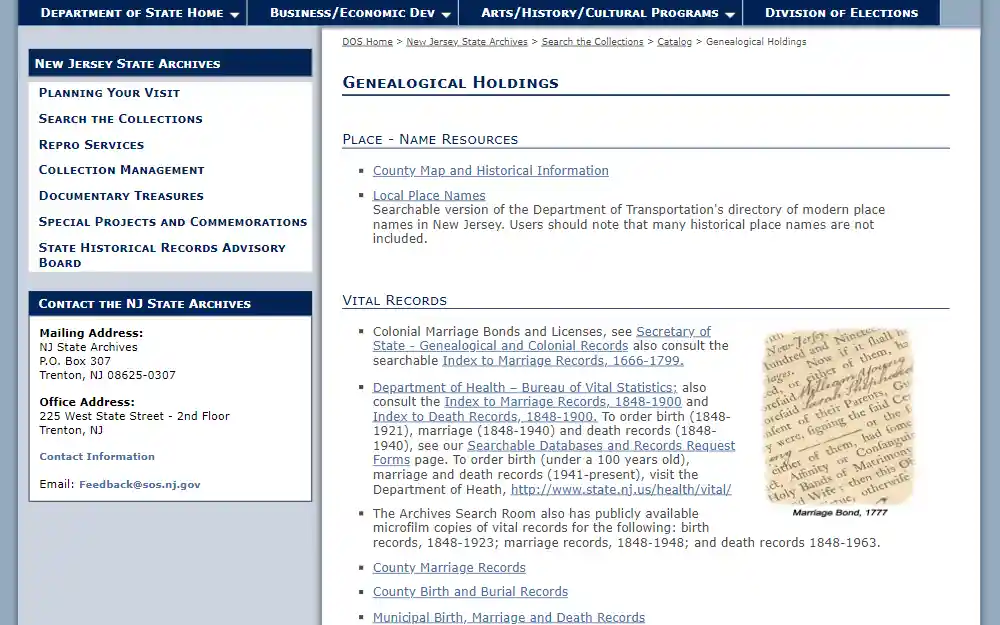
For additional information, you can call them at 609-292-6260. The New Jersey State Archives is located at the address below:
NJ State Archives
P.O. Box 307
225 W. State St.
Second Floor
Trenton, New Jersey 08625
Other options for searching archived divorce records include religious institutions, public libraries and historical societies. When it comes to archived divorce records, you may find this information in odd places, from a miscellaneous divorce index to old newspapers.
How To Check if Someone Dissolved a Marriage in NJ
In New Jersey, the legal term for a divorce is dissolution. To find out if someone had a dissolution of marriage in New Jersey, you can find this information by accessing divorce information as outlined earlier in this article.
To request a record of a person’s dissolution, you can complete and submit a Records Request Form with the New Jersey Judiciary. You can also directly contact the Clerk of the Superior Court in the county where the dissolution occurred.
Common law marriage is where the court recognizes parties as married even though they never obtained a marriage license. In states where this is recognized, the law mandates different requirements to be met, such as intent and how the parties presented themselves in public. New Jersey abolished common law marriage in 1939.
Since it no longer exists, there is also no basis for common law divorces in New Jersey.
New Jersey law authorizes same-sex marriage, civil unions and registered domestic partnerships. The legal dissolution of these relationships can be accessed in the same manner as New Jersey divorce records.
How To Initiate a Divorce & Address Divorce Petitions in New Jersey
Both requesting and responding to a divorce can come with many questions. Every state is different, so you need to know specifically what New Jersey requires for filing and serving divorce papers. On the other hand, if you have recently been served, you likely have questions on whether you need to respond and, if so, how to do so in a way that complies with New Jersey law.
In New Jersey, the first thing you need to confirm before you file for divorce is that you meet the residency requirement.
In New Jersey, a person can file for divorce if they or their spouse have been a resident of the state for at least one year. If you meet this requirement, you can file a Complaint for Divorce (along with the $300 filing fee) in the county where you lived with your spouse, or if you live out of state, you can file in the county where your spouse currently resides.
Once you determine that you meet the residency requirement and know where you can file for divorce, it’s time to prepare the document. To begin, you will have to prepare a Complaint in Divorce, Summons and, depending on your situation, other required documents.
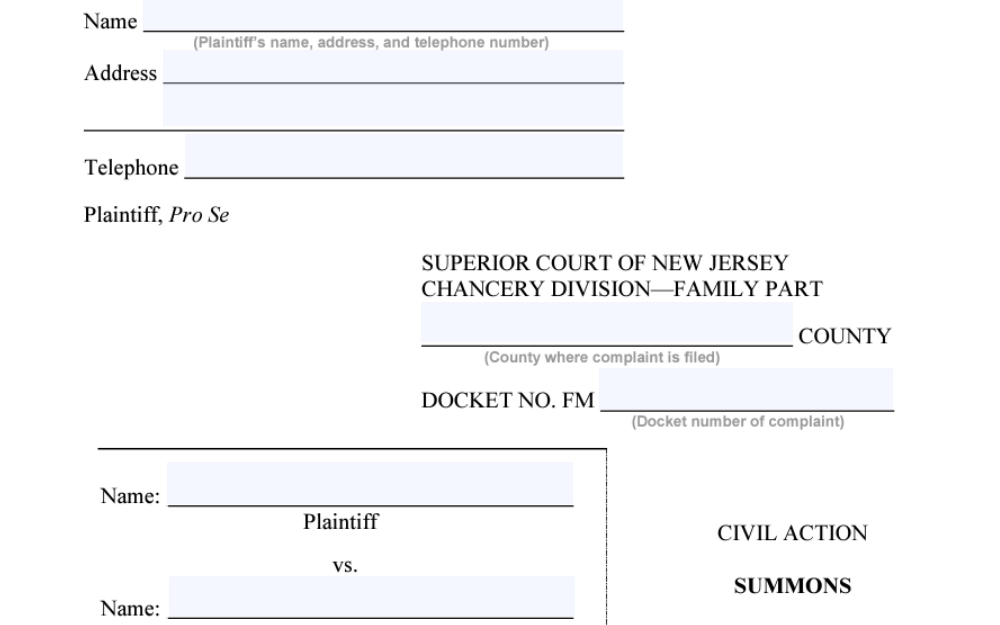
In your Complaint for Divorce, you will want to indicate the ground for divorce. One option is irreconcilable differences (no-fault). A party must claim that the irreconcilable differences have been occurring for at least six months and that there is no way to reconcile.
A person can also provide at-fault grounds, such as the extreme cruelty or adultery of your spouse.
Your Complaint should also contain your requests for what you want from the divorce. There is a wide range of requests that are typical with a divorce, including alimony, child support, custody, division of assets and others.
Note: If you are claiming your matrimony was never valid in the first place, you want to file for what the New Jersey Courts call an annulment. This is a legal proceeding where the court determines that the marriage was not valid for some specific reason. Reasons that invalidate a marriage include a party’s age at the time the party exchanged vowels, mental incompetence and whether they were free of a prior marriage.
When you file your Complaint in Divorce and receive a case number, you must then “serve” it on your future ex-husband or ex-wife. This must be done within 30 days of the filing, and you must provide the court with proof of service.
If you have been served a Complaint in Divorce, you have a say in how you believe everything should be resolved as well. A Respondent has 35 days from when they were served to provide a response.13 Your response can contest any elements of the divorce complaint as well as raise any counterclaims against your spouse.
There are processes that can make the divorce less contentious. This includes things such as mediation, arbitration and a divorce appraisal where all assets are independently and objectively valued.
However, before you take any further action, you should strongly consider contacting an attorney who specializes in New Jersey family law. They will be able to answer specific questions you have as well as walk you through the various nuances involved with New Jersey divorces.
This information should give you a well-rounded understanding of the early stages of the New Jersey divorce process; the information provided in this article has also fully equipped you to search a variety of New Jersey divorce records.
Track down additional record types using either the NJ marital information search instructions or the broader overview of finding all free New Jersey public records (warrants, court cases, property, births, deaths, and far more details).
References
1Open Public Records Act. State of New Jersey. (n.d.) Retrieved November 17, 2023, from <https://www.nj.gov/grc/act.html>
2Key Health Indicators. National Center for Health Statistics. (n.d.) Retrieved November 17, 2023, from <https://www.cdc.gov/nchs/pressroom/states/newjersey/nj.htm>
3U.S. Marriage And Divorce Rates For Women By State. United States Census Bureau. (n.d.) Retrieved November 17, 2023, from <https://www.census.gov/library/visualizations/interactive/marriage-divorce-rates-by-state-2011-2021.html>
4Records Request Form. New Jersey Judiciary. (2021) Retrieved November 17, 2023, from <https://www.njcourts.gov/sites/default/files/forms/10200_records_req.pdf>
5Courts. New Jersey Courts. (2018) Retrieved November 17, 2023, from <https://www.njcourts.gov/courts/scco>
6Copies of Court Records. New Jersey Courts. (2018) Retrieved November 17, 2023, from <https://www.njcourts.gov/courts/superior/copies-court-records>
7Contact. Bergen County Clerk’s Office. (2023) Retrieved November 17, 2023, from <https://www.bergencountyclerk.gov/Contact>
8Office of the County Clerk. Middlesex County, NJ. (n.d.) Retrieved November 17, 2023, from <https://www.middlesexcountynj.gov/government/departments/department-of-community-services/office-of-county-clerk>
9About. Essex County Clerk’s Office. (2023) Retrieved November 17, 2023, from <https://www.essexclerk.com/About>
10Office of the County Clerk. Hudson County Clerk, New Jersey. (n.d.) Retrieved November 17, 2023, from <https://www.hudsoncountyclerk.org/contacts/office-of-the-county-clerk/>
11Genealogical Holdings. New Jersey Department of State. (2011) Retrieved November 17, 2023, from <https://www.nj.gov/state/archives/catgenealogy.html#:~:text=Divorces%20%2D%20our%20holdings%20generally%20span,Office%20609%2D421%2D6100>
12Summons And Attached Proof Of Service. New Jersey Superior Court. (2019) Retrieved November 17, 2023, from <https://www.bcls.lib.nj.us/sites/default/files/2023-05/7%20Summons%202019.pdf>
13Responding to a Divorce Complaint. New Jersey Courts. (2018) Retrieved November 17, 2023, from <https://www.njcourts.gov/self-help/divorce/responding-complaint#:~:text=If%20you%20have%20been%20served,in%20favor%20of%20the%20Plaintiff.>
